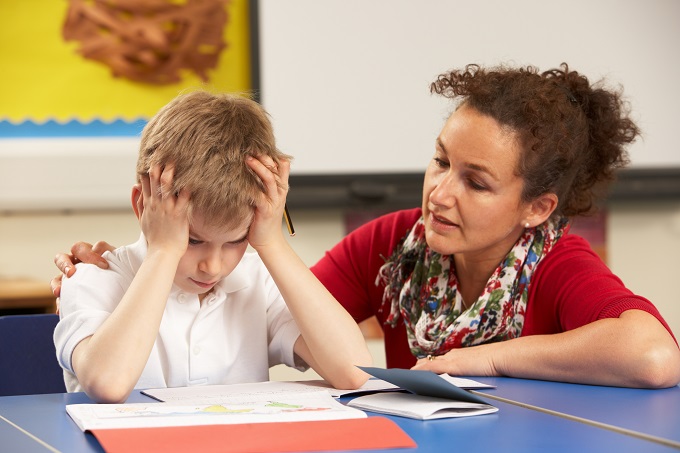

© Monkey Business, Adobe Stock
The aim of the study, as stated by QPEC, was to “gain a better understanding of experiences teaching under COVID… the survey speaks to key policy issues that will shape the future of schooling in Aotearoa.”
Read our latest print issue here.
The study surveyed 555 teachers from across the education sector and the country. Respondents covered a range of ages and ethnicities, though 75 percent were female. Although the sample could not claim to be representative, the study does offer a snapshot of the situation, and NZEI Te Riu Roa President Mark Potter noted that the findings were consistent with reports on the ground. Areas of investigation for the study were: devices and online tools in the classroom, remote and online learning experiences, support and resources for teachers, and student engagement and academic progress.
On the latter, the findings were dramatic. More than 80 percent of teachers surveyed said they observed a decline in student engagement compared to pre-pandemic levels. Teachers also reported that, on average, students weren’t completing the curriculum; this finding includes students across all deciles. Achievement gaps had also increased, falling along the lines of deprivation.
Remote learning was noted as a big disruptor for learning. Only 29 participants, or 5 percent of respondents said that continuity of learning was maintained during this period. More than two-thirds of teachers said that they, and the students, were not well-supported with online learning. Teachers cited lack of engagement in students, some of which could be attributed to weak internet connections, among other barriers.
Online learning also affected different disciplines unequally, and a lack of national direction meant there was wide variation in student and teacher experiences between schools. Maths and practical topics tended to be difficult to teach at distance, leading to disengaged students. Additionally, the lack of face-to-face support adversely affected students who needed it most, such as students with learning needs. As a result, equitable learning was not well supported.
Comments from participants said it was “vitally important” to move back to classroom learning. Benefits listed included a more stable learning environment and a social learning context. Classroom learning was also perceived to be more efficient as well as effective, due to instant learning feedback.
However, the move back toward face-to-face learning has not been smooth. Although there have been reports of “truancy” in the media, the problem appears to be much more widespread, with the survey finding that less than 40 percent of students attended school regularly. Teachers indicated this was due to disengagement, and believed the issue could continue into 2023.
Teachers identified barriers to online learning that may partially explain these findings. One of the first was that most whānau were not equipped to offer adequate academic support. The report noted that “parents, however well meaning, are not trained in the education of their children and were overwhelmed by the challenges of motivating learners and maintaining a schedule of education”. Single-parent households and those without devices were particularly disadvantaged.
Another barrier in remote learning was a lack of learning spaces for ākonga during lockdown, leading to distractions and incomplete tasks. Some families were also not well equipped to support the learning either due to their own educational background, or the other challenges of lockdown such as work obligations, poor mental or physical health and isolation. The report noted that “family resourcing is a key factor in all education modes”, as teachers reported those ākonga with the most resources were generally also ākonga who needed less intervention.
Barriers were also identified in the medium of online learning itself. The online environment was described as rich in distractions, though some motivated students could work well on devices. Devices also represented an equity issue.
Gaps in research were also highlighted by the report – although teachers saw and reported a slow return to school, especially for lower deciles, there was a lack of knowledge on the factors that contributed to this pattern.
On the findings, Dr Liz Gordon, the report’s main author, noted that “Many participants believe there will be no happy ‘back to school’ for all students in 2023.”
NZEI Te Riu Roa President Mark Potter said that the biggest concern is that “issues that developed during lockdowns are continuing as we return to ‘normal’ this year.”
“Teachers and principals need more time to meet increasingly complex work demands,” Potter continued.
“What this initial report shows is how much the pandemic exacerbated these issues.”
As a result of these findings, the QPEC is recommending several courses of action, including a focus on supporting young people back to school. Significantly in an election year, QPEC is also calling for “national leadership” which focuses on the value of education and recognises the barriers to education that are affecting many whānau, like the cost of living.
The full report and its findings can be read here.
The much-delayed English draft curriculum is now out for consultation, generating discussion from teachers.
Research from AUT demonstrates arts, culture and recreation have positive impacts on all aspects of…
How effective has the school phone ban been in achieving its aims? Researchers from the…
School camps and excursions deliver hands on learning experiences, helping to consolidate classroom learning.
Innovations in AV technologies present new opportunities to engage with students. We look at how…
A new report from the University of Auckland’s Our Voices Project asks young people what…
This website uses cookies.